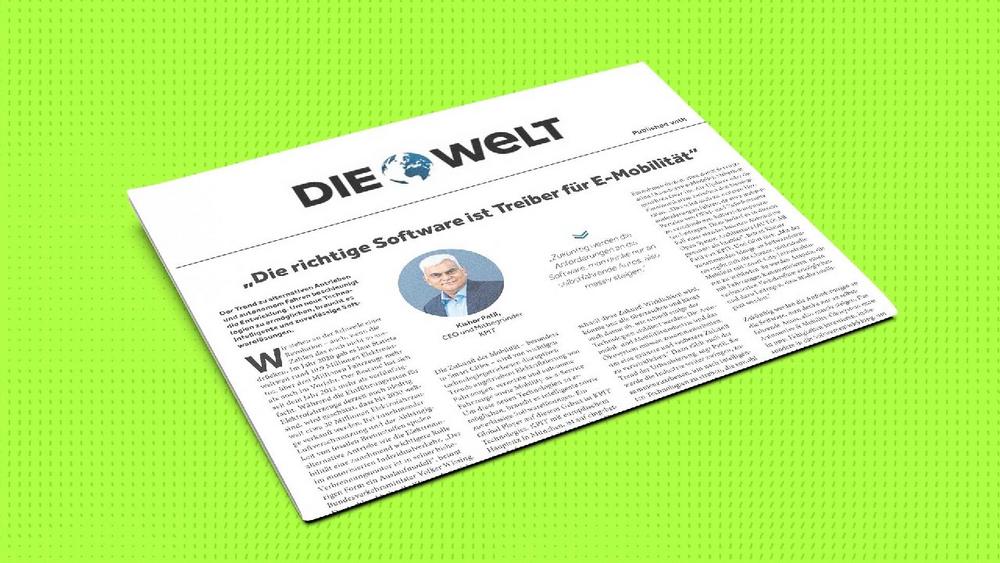We are on the threshold of a revolution – even if the numbers don’t say it that way. According to Statista, there were around 10.9 million electric cars worldwide in 2020, over three million vehicles more than in the previous year. The stock has increased more than fiftyfold since 2012. While EV adoption rates are currently low, it is estimated that around 30 million EVs will be sold worldwide by 2030. With increasing air pollution and dependency on fossil fuels, alternative drives such as electromobility are playing an increasingly important role in motorized private transport. “In its current form, the internal combustion engine is a phased-out model,” emphasizes Federal Transport Minister Volker Wissing. Germany has signed the Paris climate protection goals and must comply with them. The transport sector should make its contribution to this.
The future of mobility – especially in smart cities – is driven by important technology-driven disruptive trends: Electrification of vehicles, connected and autonomous vehicles as well as Mobility-as-a-Service. Intelligent and reliable software solutions are required to enable these new technologies. A global player in this field is KPIT Technologies.
With a European headquarter in Munich, KPIT specializes in embedded software and has in-depth know-how in the area of CASE – i.e., connectivity, autonomy, shared mobility, and electrification. Their software has already proven itself in numerous vehicle models on the road. On the way to future mobility, KPIT works with the global automotive industry and offers innovative solutions.
CEO and Co-founder Kishor Patil sees the company in the role of a sustainable software integrator. “The future belongs to electromobility. How fast this future becomes a reality might surprise us all and also depends on how quickly some of the technologies are mainstreamed. The automotive and mobility industry and the ecosystem must work together to achieve a greener and cleaner future.” This also includes the trend towards urbanization, says Patil. It will further force the industry to work together to strive for intelligent technologies that will be used in both smart cars and smart cities.
The impact of electrification on mobility is huge. The shift to electromobility is increasingly focusing on the role of software. This means that the percentage of software and complexity in electric vehicles will continue to increase. Software-enabled functions should offer the driver added value and help to differentiate vehicle brands. In addition, software services can be used to generate new revenue, for example through servitization (as-a-service models). Over-the-air updates or communication between the control units ensure security. “This will also lead to other challenges, such as multiple parties from the OEM and supplier side contributing to different software components. In this case, this requires a standardized Automotive Open System Architecture (known as AUTOSAR) as an enabler,” emphasizes Kishor Patil from KPIT. And continues: “With the increasing number of software features, there is an opportunity to combine individual mobility with smart city infrastructures. Traffic lights that communicate with vehicles will enable improved traffic flow and help cities become intelligent.”
In the future, the demands on software, just think of self-driving cars, will increase massively. The Automotive & Mobility ecosystem needs to invest in new skills, especially in software development, to complete the tasks. “More standardization and open source will reduce complexity. The future automotive & mobility ecosystem includes not only OEMs and suppliers, but also smart traffic infrastructures and individual needs. But most important: Software integration capabilities determine whether ideas move from prototype to production”, says CEO Kishor Patil of KPIT. Good industry-government collaboration can accelerate this technological revolution.
The article is posted on page 39, the 7th March 2022 publication with Die Welt online. Click here to read the paper version.
KPIT Technologies GmbH
Frankfurter Ring 105b
80807 München
Telefon: +49 (89) 3229966-0
Telefax: +49 (89) 3229966-99
http://www.kpit.com
Head of Marketing Germany
Telefon: +49 (89) 3229966-140
Fax: +49 (89) 3229966-999
E-Mail: stefanie.koehler@kpit.com
![]()

